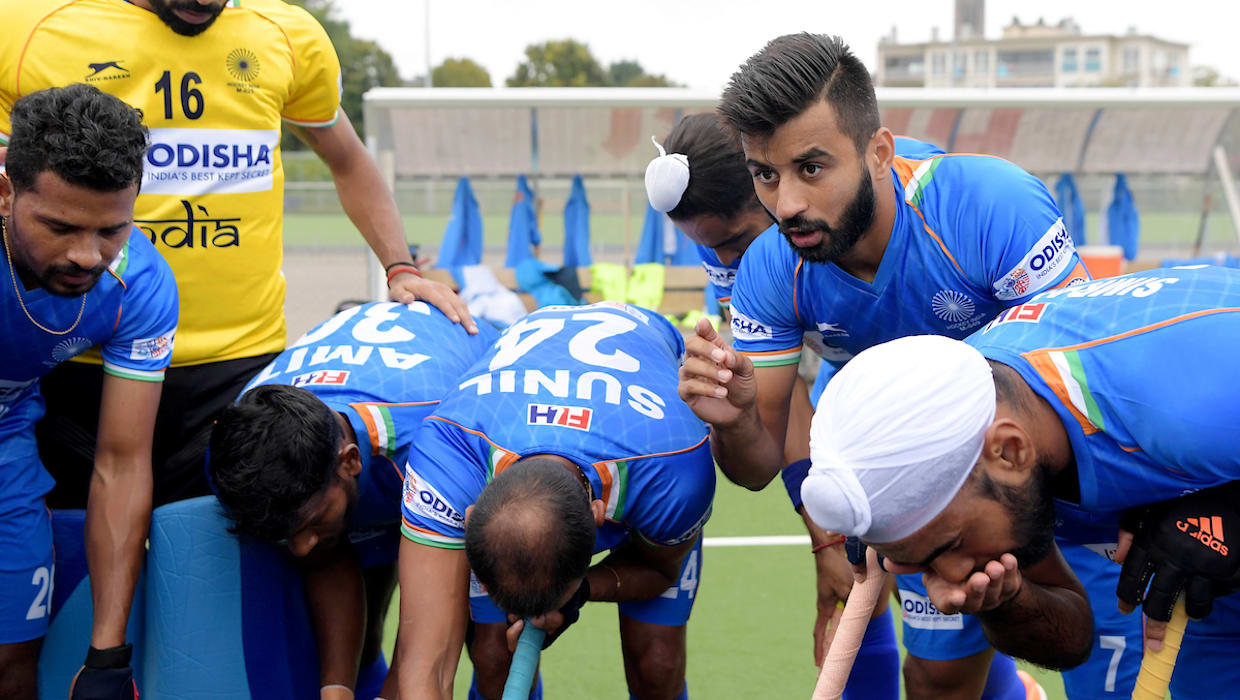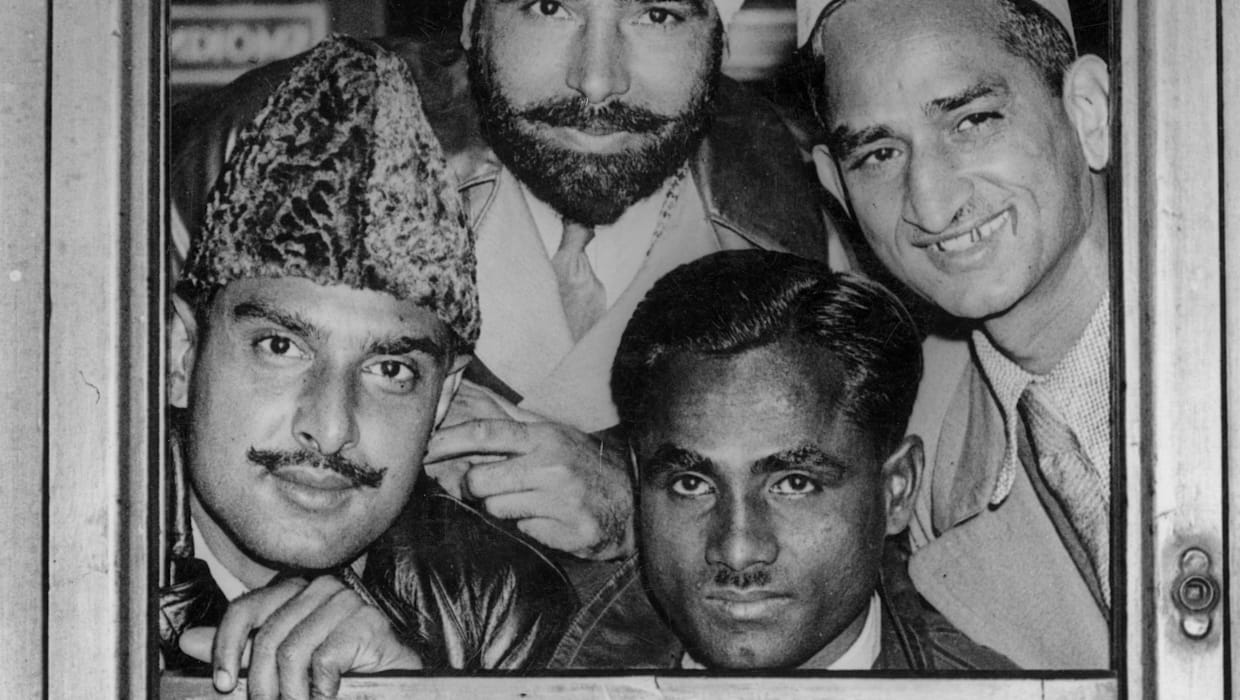News for 16 July 2021
All the news for Friday 16 July 2021
2021 Test matches JPN v CAN (M) - 16 July
City Okayama (JPN)
16 Jul 2021 JPN v CAN 2 - 3
17 Jul 2021 10:00 (GMT +9) JPN v CAN
FIH Match Centre
Tokyo 2020 – Message from FIH President Dr Narinder Dhruv Batra
“Dear Members of the global hockey community, dear hockey fans, dear all,
Following a delay of one year due to the unprecedented times of pandemic that we are currently living through, I can put my hand on my heart and tell you how genuinely overjoyed I am that the Games of the XXXIInd Olympiad are finally here.
The chance to celebrate the world’s finest athletes on the world’s greatest global sporting stage is a hugely positive thing for all of us.
The organisers of Tokyo 2020, along with great support from the Japanese government, the International Olympic Committee (IOC) and International Federations such as our own, have gone to extraordinary lengths to ensure that the Games can be staged as safely as possible.
I personally want to thank them for their incredible efforts towards this cause, ensuring that the greatest sporting show on earth can finally take place.
With the ultimate prize of an Olympic gold medal on the line, the Olympics have a unique place within the global hockey calendar. The FIH is extremely proud to be part of the Olympic family, with Hockey enjoying a long and glorious history at the Olympic Games.
Hockey made its debut at the 1908 Games in London and has been a permanent fixture in the Olympics since the 1928 Games in Amsterdam, with a women’s competition being a central part of proceedings since the Moscow 1980 Games.
Our association with the Olympic movement has allowed thousands of athletes to fulfil the life-long dream of representing their country at the greatest sporting spectacle on the planet.
The Olympics has always been considered as the pinnacle of the sport, and long may that continue.
I am very much looking forward to seeing all of the teams in action at the stunning Oi Hockey Stadium, the state-of-the-art stadium that will provide a lasting legacy for Japanese Hockey over the coming decades.
I invite all hockey fans around the world to follow very closely this year’s hockey Olympic events. Thrilling matches guaranteed!
Finally, I want to wish all of the athletes and officials the best of luck on the field – you all deserve to be here and will no doubt put on an incredible showcase of our sport for the world to enjoy. Thank you for everything you do for hockey!”
#Tokyo2020
#StrongerTogether
#HockeyInvites
FIH site
Olympic Games Tokyo 2020: Spotlight on Argentina
The men’s and women’s teams of Argentina are the subject of the latest of our FIH Spotlights series, with the two behemoths of Pan American hockey more than capable of challenging for the title at the Olympic Games Tokyo 2020.
‘Las Leonas’ (The Lionesses) have long been considered as one of the world’s most fearsome attacking teams and are undisputedly a true powerhouse of the game. Since the 2014 retirement of eight times FIH Player of the Year Luciana Aymar – unquestionably one of the greatest players in the history of the sport – Argentina have claimed numerous titles, including the 2016 Champions Trophy, the 2017 Pan-American Cup and the 2019 Pan American Games, with the latter sealing their spot at the Olympic Games Tokyo 2020. As one of the very few teams in world hockey to have beaten reigning World, European and FIH Hockey Pro League champions the Netherlands in recent years, they will feel that the gold medal is certainly within the realms of possibility.
For decades, Argentina’s men were hidden in the long shadow cast by the remarkable achievements of their female counterparts. A bronze medal at the Rabobank Hockey World Cup 2014 in The Hague (NED) changed everything, with Los Leones (The Lions) going on to claim Olympic gold – something that even Las Leonas have not achieved – at Rio 2016. Can they defend their title in Tokyo? With inspirational coach Carlos Retegui – who is also overseeing the women’s team in Tokyo – at the helm alongside Mariano Ronconi, you wouldn’t bet against them.
Ahead of Las Leonas’s title challenge in Tokyo, we spoke to penalty corner ace Agustina Gorzelany about how preparation for the competition have been going.
Agustina Gorzelany, thanks for talking to us! The Olympic Games Tokyo 2020 is so close now, and [as we talk] your team are in Valencia [ESP] for your final training camp before arriving in Tokyo. How are you and your squad feeling ahead of the Games?
Agustina Gorzelany: “It has been great for us to come here to Valencia, to have these international matches to get into a good rhythm and increase our confidence in these times of covid. In Argentina we couldn’t play many matches, so for us it is very important to start having these international games. We need to be better every day if we are to get to Tokyo in the best way we can.”
It will be your debut Olympics, which must be incredibly exciting. You must be very proud of representing Argentina with Las Leonas at the Olympic Games.
Agustina Gorzelany: “Yes, I cannot believe it. I’m living a dream. As days pass, we are nearer to the first game, getting excited and really looking forward for Tokyo to start.”
When you arrive, you face a pool containing Australia, New Zealand, Spain, China and Japan, the hosts nation. You start your campaign against New Zealand on 25th July. What are your thoughts about the pool and how important is it to finish as high up the standings as possible ahead of the cross-over quarter-finals?
Agustina Gorzelany: “I think that all teams are going to be tough, all are training as hard as we are. I think they are all going to be very strong opponents, no matter which group you are in. What is most important for us is to win every game to be first in the pool, and then we can have quarter-final which might be better for us. I think that it is very important for us to end up first in the pool.”
Are you and your team feeling confident about your chances of success in Tokyo?
Agustina Gorzelany: “Of course! We all think that we can reach what we are dreaming [about], but I think we need to take it step by step, and not thinking about the gold medal. There is a long way [to go], so we need to think about our first game and then take each day as it comes.”
As one of only a handful of teams to beat the Netherlands in recent years, does that give you additional confidence?
Agustina Gorzelany: “I don’t know. We are a good team, just like the Netherlands are. I think that if, one day, we are going to play them then it is going to be a difficult match. But I think we have a lot of chances to beat them. We have been preparing for this thing since 2019, so it has been a very long road. But I think we are going to do very well.”
It would be amazing if Las Leonas can follow in the footsteps of Los Leones, who won gold at Rio 2016. Does that inspire you?
Agustina Gorzelany: “It is very difficult to imitate them, because they had a really incredible ending – they got their gold medal. Of course, we are going to fight for that to happen to us, and it is very difficult. But yes, it is really inspiring. In my opinion, and for me, it gives me more energy. It makes me think that we are a little bit nearer to that ending. But as I already said, it is step by step, match by match.”
The hockey competitions at the Olympic Games Tokyo 2020 will take place from Saturday 24 July to Friday 6 August 2021. Both the men’s and women’s competitions feature 12 teams, split into two pools of six ahead of quarter-finals, semi-finals and medal matches. For more information about the hockey competitions at the Olympic Games Tokyo 2020, visit https://tokyo2020.org/en/sports/hockey/.
Visit Watch.Hockey App to view the video interview in full.
#Tokyo2020
#StrongerTogether
#HockeyInvites
FIH site
Belgium determined to improve on Rio Games silver
Belgium bounced back from the disappointment of a loss in the Rio Olympics gold medal match to win the World Cup in 2018, and will start the 12-team Tokyo Olympics tournament as favourite.
Belgium captain Arthur van Doren. - AP
There were few things more annoying for Belgian hockey player Arthur van Doren than the expression “you’ve got to lose a final before you win one.”
What was an attempt to console Van Doren after his team had to settle for the silver medal at the 2016 Rio Olympics only served to make his blood boil. But the 26-year-old defender, twice named hockey’s Player of the Year, begrudgingly admits there might be a modicum of truth to it.
He and his team-mates have bounced back from the disappointment of a 4-2 loss to Argentina in the gold medal match to win the World Cup two years later and will start the 12-team Tokyo Olympics tournament as favourites.
“I found that annoying but there is a little bit of truth in it. Losing acquires a bit more hunger, it pushes you to train and work a little bit harder and I think we acquired some experience from that match,” he told Reuters in an interview.
“It ended up being a difficult moment, because you obviously want to win, but a very good lesson for the future.”
Since Rio, Belgium has gone from strength to strength, taking the World Cup in India, then a first-ever European title in 2019, and this year’s ProLeague, a round-robin competition involving the world’s top nine hockey-playing nations.
RED LIONS
The Rio Games silver medal has been the spur to go on to better things. “It’s obviously a very nice memory but we also kept it as fuel for tournaments after that as well, for example the World Cup and the Europeans,” Van Doren said.
Belgium’s Red Lions are reaping the rewards of an ambitious talent identification programme launched more than a decade ago which has catapulted the small country into the ranks of the world’s best.
“It’s not often that a generation produces five or six really top hockey players. Probably every generation has one or two but not four, five or even six (who) have ended up being the spine of the Red Lions at the moment,” he added.
Olympic gold would be the cherry on top.
“You have to be realistic, there are perhaps four-five really good contenders for the gold, so in hockey nowadays if you are not at 100 percent you are going to lose to a lot of teams,” he added.
“It’s going to be an interesting tournament … with the virus, the protocols, the heat. We will focus on our process and the things we think we need to do to be successful.
"If we end up being successful … awesome … if we don’t we will definitely have done everything we could."
Sportstar
Koolen gets her Olympic chance but admits mixed feelings after club mate’s injury
Sanne Koolen has told hockey.nl she has “mixed feelings” following her recent induction into the Dutch central panel for the Olympic Games.
She was initially on the outside but Ireen van den Assem – whom she has played with for Den Bosch for the past number of years – was forced out of the competition through injury to open the door.
It continues a strange run of tournaments for the Dutch defensive line-up with one of their list being injured for each of the 2018 World Cup and the 2019 and 2021 Euros with Koolen an ever-present and performing well each time with gold medals each time.
“I think it’s very close in the back [for selection],” she told hockey.nl. “The differences are not that big. Alyson [Annan] was in a luxury position that she could choose from several defenders.
“I think I’ve done a good job all this time. I’ve played some nice tournaments. In the past period I have also participated in all our international matches. I felt like I was comfortable. I also had a good feeling about the European Championship. The fact that I subsequently lost my spot for Tokyo was a hard blow to me.”
“I had really hoped I would be in the group of sixteen. I also had a conversation with Alyson and she told me to stay sharp because you don’t know what’s going to happen and you see that now.
“Ireen’s injury left me with mixed feelings. I know her well, of course, from Den Bosch. I really wished she could go to Tokyo. She has worked very hard for it.
“On the other hand, I’m naturally happy for myself. I have turned the corner and am going full steam ahead. For me, personally it is fantastic that I have the opportunity to realise my Olympic dream.”
Euro Hockey League media release
Birendra Lakra braved injuries and now will be a star to watch at Tokyo
SATISH SHARMA
Birendra Lakra, heaved a sigh of relief on June 18, 2021, when he was named among 16 players bound for the postponed 2020 Tokyo Olympics.
A man who has been an unbreachable wall on the hockey pitch faced serious challenges from younger players which kept him on tenterhooks. The defender asserted that such is the Indian team’s bench strength now that no player can take his place for granted.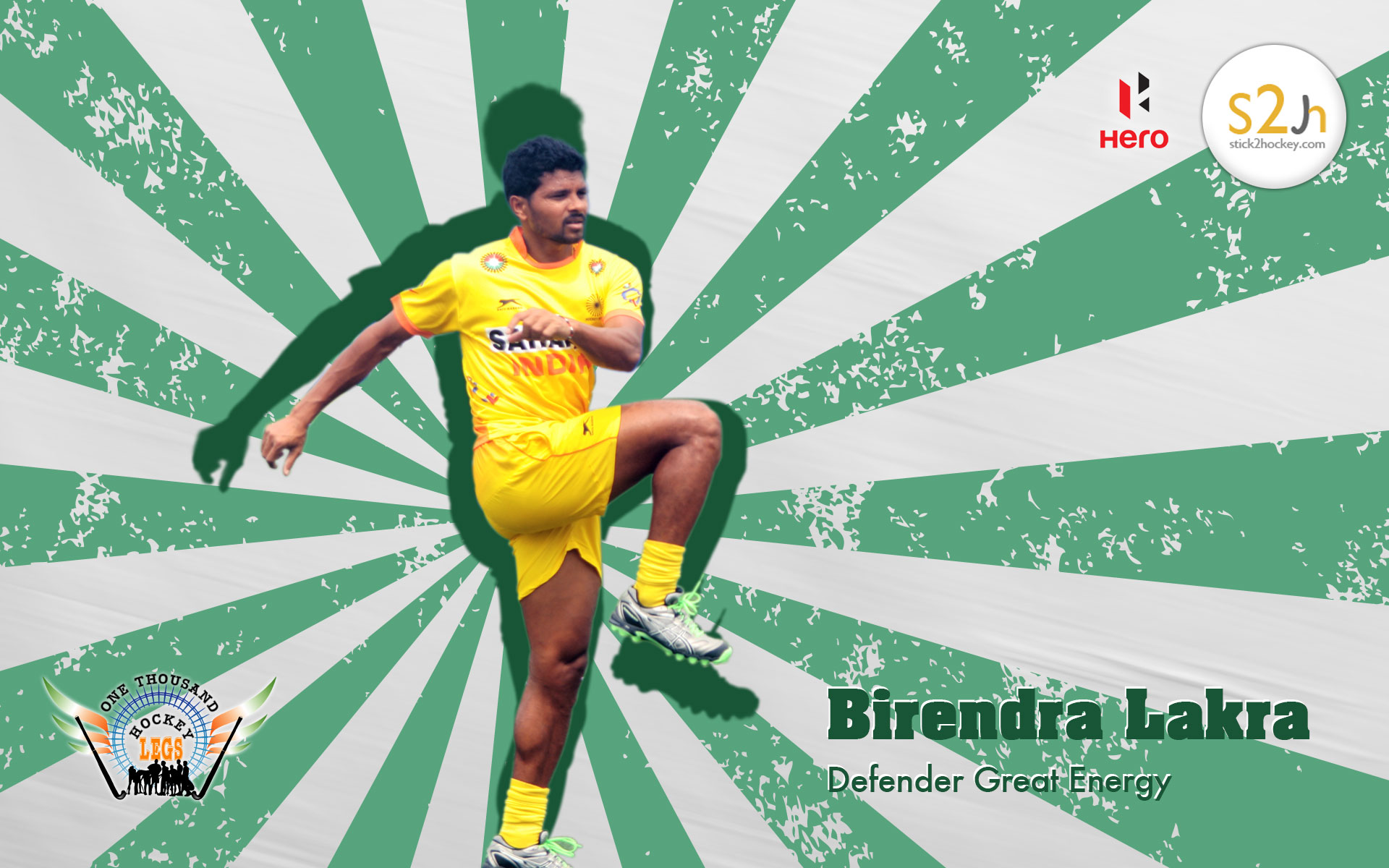
“Even though I am one of the most senior players, my place in the team is not guaranteed. There is a lot of competition for each position and it keeps us all on our toes,” he said.
Let’s not forget here that Lakra had to wait nine long years for an opportunity to play in his second Olympics. He first played in the 2012 London Olympic Games but sadly missed the 2016 Rio edition because of a ligament tear in the right knee. “I felt sad to miss the Rio Olympics, but I was not fully fit for such an important event. After all, the team’s interest should be above personal glory,” he stated.
Along with finding a place in the team to Tokyo, Lakra has also been named vice-captain, the responsibility he will share with another defender Harmanpreet Singh.
“It is a matter of pride for me. We just hope to work hard and make sacrifices count by winning a medal,” Lakra said.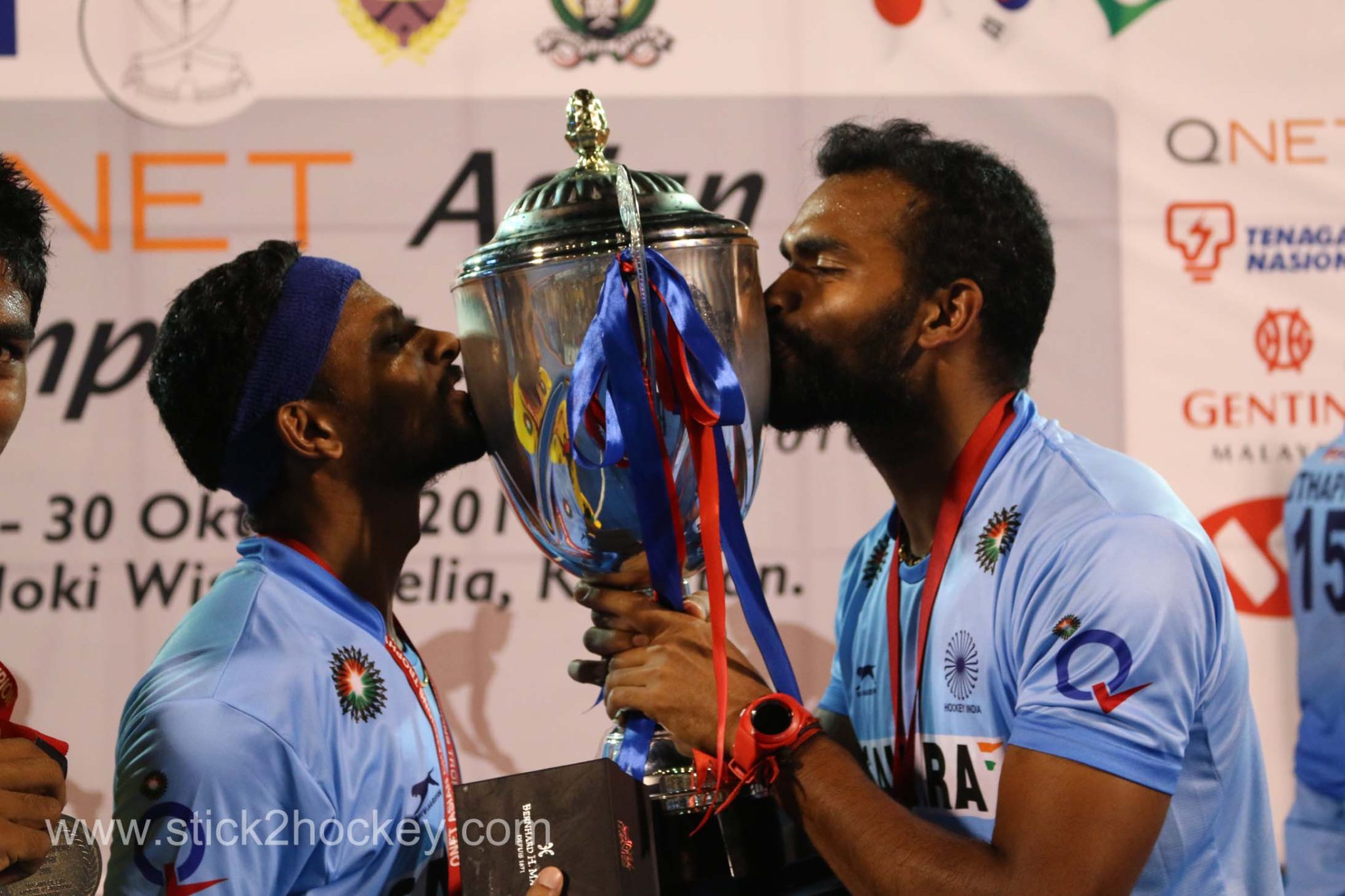
Birendra and Sreejesh (r) share a victory moment. Both are vital cog in the Tokyo team
Lakra endured hard times after missing the Rio Olympics. After recovery, the unassuming and composed Birendra set his eyes solely on ensuring he remains fit and absolutely ready for the Tokyo Olympics. He resolutely and earnestly worked on a comeback and within a year was back in the team.
The 31-year-old veteran of 197 matches has been vital to the team’s defence in the last couple of years. Born on 3rd February 1990 in a small hamlet called Lachhra in Gurundia block of Sundargarh district to Ignes Lakra and Mary Lakra, he is the youngest of six siblings comprising four sisters and a brother.
He picked up the stick at a tender age in his village and talent came to the fore when he moved base to Rourkela and joined the Day Scholar Scheme launched by Rourkela Steel Plant to promote hockey in 2003. He learned the basics of the game under the tutelage of Peter Tirkey, a junior international.
In 2004 he joined SAIL Hockey Academy (SHA) and underwent training till 2010. He was trained there for a year by Harman Lakra, and from 2005 Raju Kant Saini, a NIS coach, honed his skills.
Blessed with resilience, endurance, and an inbuilt flame of aggression, he became a regular player of the SHA in the first year itself.
Birendra Lakra grew up idolizing former India fullback Dilip Tirkey. It’s hardly a surprise that, like his idol, Birendra has become a nightmare for opposing forwards.
He played his first U-21 nationals in 2004 at the age of 14 at Jabalpur where SAIL finished runners-up losing to Services 2-3. In 2007 SAIL claimed the U-18 national trophy where Birendra scored a hat-trick against SAI in the final.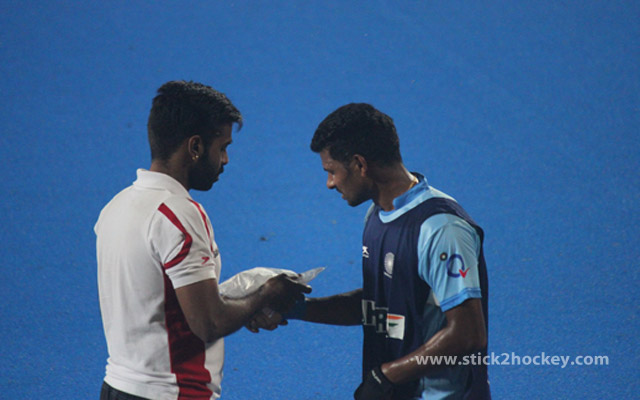
Due to injury Birendra missed the Rio number
His performance earned him a place in the national junior team which toured Singapore in 2007. In 2009 he represented the country in the Youth Olympics in Sydney and the Junior World Cup at Singapore. He was promoted to the senior team to play in the SAF games at Dhaka in 2010 and in the same year he toured Europe with the senior team. Since then there has been no looking back.
Rajukant Saini, his coach and mentor, talks proudly about his pupil. “Ever since he joined SHA he has been a very hard worker. He is a very versatile player who can play in various positions which makes him an asset for any team,” said Saini.
He described Birendra as a very committed player who is always ready to carry a maximum workload.
He narrated an incident during Birendra’s early days in SHA. “In 2005, an East zone team was formed and Birendra did not find a place in the list of probables. He started crying over his omission. I consoled him, saying that a day would come when a five-letter word ‘INDIA’ would adorn his jersey. I am happy that within two years he made his debut in the national junior team,” he added.
Saini feels India has a genuine chance of winning a medal at Tokyo. “This time the team has a very motivated set of players which raises expectations,” he remarked.
The Indian team over the past few years has achieved important milestones including
a gold medal at the 2014 Asian Games, silver at the 2014 Commonwealth Games, titles at the 2017 Asia Cup and 2018 Asian Champions Trophy, a bronze medal at 2018 Asian Games and victory in the FIH Series Final in 2019.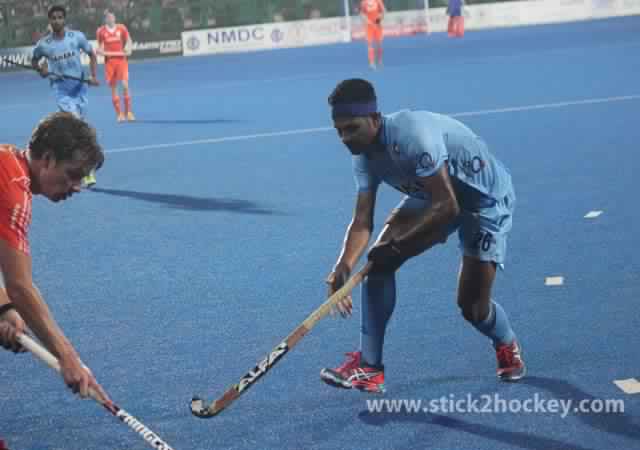
“They also performed exceedingly well in the 2020 FIH Hockey Pro League before the pandemic disrupted the schedule. These are noteworthy achievements to which Lakra contributed,” Saini added.
What’s more, the team has improved its world ranking and is currently at No.4.
In the domestic circuit too, Birendra performed creditably. He was picked up by the Ranchi franchise for the 2013 edition of the Hockey India League and played a pivotal role in its title triumphs in 2013 and 2015.
Talking about the Indian team’s chances Lakra said, “We have worked very hard and sacrificed a lot. All the members are fully motivated and bubbling with positive energy. We are extremely hopeful of a podium finish,” he concluded.
Stick2Hockey.com
In pursuit of history and a piece of precious metal
Manpreet’s men aim to end four decades of heartbreak; Rani’s women keen to take next big step after qualifying twice in a row
Y.B. Sarangi
The Indian hockey teams have the wherewithal and talent to gladden the hearts of the faithful with an Olympic medal after more than four decades.
History will be repeated when men’s hockey team captain Manpreet Singh carries the Tricolour, along with boxing legend M.C. Mary Kom, at the opening ceremony of the Tokyo Olympic Games. Manpreet will be India’s first hockey player to do so after Pargat Singh in 1996.
The inspiring midfielder and his well-knit team will be keen to see history revisit India on the turf as well. In four decades, India has not made it to the semifinals.
Carrying a billion dreams: The Indian hockey teams have the wherewithal and talent to win an Olympic medal after more than four decades.
Carrying a billion dreams: The Indian hockey teams have the wherewithal and talent to win an Olympic medal after more than four decades.
The most successful hockey nation in the Games’ history has not earned a podium finish after its gold in 1980.
The men and women have given themselves an extra ounce of motivation by making a nationalistic announcement — any medal, if it comes, will be dedicated to the COVID-19 warriors of the country.
Manpreet and his squad have prepared well for the arduous task of achieving a long-desired medal. Steeling the body and the mind to overcome doughty opponents and tricky situations has been one of the key aspects of their preparations. The well-balanced team has pedigree and promise.
The defence is experienced, the midfield is energetic and the forward line is sharp. Drag-flicker Harmanpreet Singh and Co. will enhance the goal-scoring scope.
Medals in top level events — including the Champions Trophy, World League, Asia Cup, Asian Games and Asian Champions Trophy — apart from recent wins over reigning Olympic champion Argentina in the FIH Pro League have instilled self-belief in the side.
The experience of playing against Germany and Great Britain will also help.
Clubbed in Pool A with Argentina, Australia, New Zealand, Spain and Japan, the Graham Reid-coached team has the potential to break the jinx.
The women’s hockey team, which made it to the Rio Games after 36 years, is eager to take the next big step by ensuring a respectable finish in Tokyo.
The team has shaped well under the guidance of coach Sjoerd Marijne.
Led by the iconic Rani Rampal over the last four years, it has claimed medals in elite events, including the Asia Cup, Asian Games and Asian Champions Trophy, apart from securing a top-eight finish in the 2018 World Cup.
Solid leadership group
Rani forms a solid leadership group with vice-captains Deep Grace Ekka and Savita. Like a beacon light, they will play a key role in steering the side, consisting of youngsters as well as seasoned campaigners, on the Olympics’ high-pressure platform.
The side has developed qualities such as fighting till the end, playing without fear and understanding each other’s role well.
The players will need to stay calm and rely on their fitness to execute the plans well.
Some proven customers in the back line, apt performers in the middle and an interesting combination of seasoned hands and greenhorns up the field sum up the team’s strengths. Gurjit Kaur will be the leading hand in penalty corner conversion.
Members with loads of experience but relatively less exposure may spring surprises on opponents. Exposure tours to Germany and Argentina early this year should prove beneficial.
India, placed with World, European and Pro League champion Netherlands, Olympic champion Great Britain, Germany, Ireland and South Africa in Pool A, will have to give its best in order to achieve a dream finish.
The hot and humid weather of Tokyo should make both the Indian teams feel at home. Hockey fans will eagerly wait to see how seamlessly the Indians switch to Games mode in pursuit of a piece of the historic metal.
The Hindu
Tokyo Olympics 2020, Form Guide: Tracking Indian men's hockey team over last two years
Firstpost.com charts the the Indian men's hockey team's fortunes over the last two years heading into Tokyo 2020 Olympics.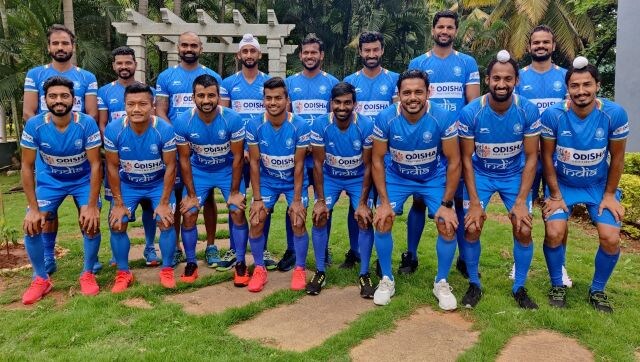
India Men's hockey team for Tokyo Games. Image: Hockey India
Editor's Note: For five years now, Indian athletes have been dreaming to make up for the disappointment of a two-medal haul in Rio. The span has been extraordinary, with COVID-19 having thrown their preparations - and the Olympics itself - off gear. However, in true Olympic spirit, the country's finest sportspersons have battled form and uncertainty to put their best foot forward in what promises to be a Games like none other. In our latest series, we track the last two years' performances of our athletes to give you a ready guide to their form leading into the biggest sporting spectacle of the world.
High at Olympic test event
Missing senior players like captain Manpreet Singh, goalkeeper PR Sreejesh and Surender Kumar, the Indian men's team headed to Japan to play in the Olympic Test Event in August 2019. The team, led by Harmanpreet Singh, started their campaign with a dominant 6-0 win over Malaysia, but were handed a 1-2 defeat by New Zealand in the next game. They bounced back with a 6-3 rout of hosts Japan to make it to the final, where they again met New Zealand. This time around, India exacted revenge for the defeat in the round-robin stage by beating New Zealand 5-0 to win the Olympic Test Event.
Victorious Belgium tour
In September 2019, India headed to Antwerp where they were to play five matches against World No 2 Belgium and World No 8 Spain. They won all five of their matches, beating Belgium 2-0, 2-1 and 5-1 and also brushed aside Spain with 6-1 and 5-1 margins of victory.
Sealing Tokyo 2020 spot
The men’s team could have sealed their qualification for Tokyo 2020 at the 2018 Asian Games in Jakarta. But that opportunity slipped out of their hands after they could manage only a bronze medal. Another window for them to book their ticket for the Tokyo Olympics came when they were drawn against World No 22 Russia in a two-legged Olympic qualifier in Bhubaneswar’s Kalinga Stadium.
The World No 5 team were clinical in the qualifiers, beating Russia 4-2 in the first leg. In the second leg, they had a scare early on as Alexey Sobolevskiy scored with just 25 seconds on the clock. The goal was a reminder to India that they could not afford to think of the Olympic quota as a foregone conclusion on the back of their two-goal victory margin from the first leg. It was only in the second quarter that a Lalit Upadhyay goal helped them level the match and restore some semblance of normalcy in the proceedings. Indians soon pumped in six more goals into the Russian net, sealing their spot at the Olympics with a commanding 7-1 win.
Upsets over Netherlands
Participating in the FIH Pro League for the first time, World No 5 India went up against World No 3 Netherlands in a double-header at the Kalinga Stadium in January 2020. In the first game, the Indian team had a blistering start, scoring the first goal inside a minute after Gurjant Singh robbed the ball, passed it to Mandeep Singh and went on to score for India’s fastest ever goal. There were moments of dazzling wizardry from the Indians in the match, including Rupinder Pal Singh contribution of two goals from penalty corners. Mandeep also scored a vital goal in the contest, turning and slotting it into the goal while surrounded by three Dutch players. Lalit Upadhyay rounded off the tally with an easy tap-in.
In the second game between the two sides, played the next day itself, India won after a tense penalty shootout. The Dutch were 3-1 ahead at one stage, but India fought back to level the game 3-3 to take the game into a shootout. Lalit Upadhyay scored India’s first on the day, inside a minute of the Dutch taking a 1-0 lead. India’s joy was short-lived, however, as the Netherlands took a 3-1 lead before the second quarter had ended. Things went from bad to worse for India as captain Manpreet Singh was shown a green card, resulting in India playing 10 minutes of the third quarter with just 10 men. India managed to hold on to the two-goal deficit in the face of repeated Dutch attacks until Manpreet got back on the field in the fourth quarter. With their numerical disadvantage wiped out, India mounted a comeback with two goals, both coming off penalty corners. In the first, Mandeep Singh scored off a rebound, while Rupinder Pal Singh shot his penalty corner strike straight down the middle to level the game and take it into a shootout.
Once the shootout began, India chose the grizzled PR Sreejesh to stand in goal instead of his young understudy Krishan Pathak, who was in goal for the two games. Sreejesh’s steady presence under the bar ensured the Dutch couldn’t score off their first three attempts. Vivek Prasad, Gurjant Singh, and Akashdeep Singh scored on the other end to win India the contest.
Standing tall against Belgium and Australia
In February 2020 — right on the back of the twin upsets over the Netherlands — India took on Belgium and Australia in two double-headers at Bhubaneswar.
The Belgian team was ranked No 1 in the world, were on top of the Pro League standings, and were the reigning world champions. But Team India, paying no heed to reputation, edged past the Europeans with a 2-1 margin. In fact, India were up just 90 seconds into the game with Mandeep Singh turning in the ball after some deft stickwork from Vivek Prasad and Dilpreet Singh. The game saw India’s keeper Krishan Pathak — the young understudy of PR Sreejesh — pull off some incredible saves, particularly in the first quarter. Both keepers were at the top of their game to restrict Belgium, who had 18 shots (to India’s three), 27 circle penetrations (India had 14), and had eight penalty corners with a proven goal-poacher like Tom Boon in their ranks. The Belgians eventually scored through Gauthier Boccard, but Ramandeep Singh’s opportunistic winner 13 minutes later sealed the deal for the Indians.
In the next day’s game, it was Belgium that came to the field all guns blazing. They took the lead with a penalty corner in the third minute itself. In those three minutes, Sreejesh had already pulled off a double-save, but Alexander Hendrickx’s PC flashed past him. Some fine stickwork from Surender Kumar and Vivek Prasad’s goal then levelled the scores, but not for long as Nicolas De Kerpel gave Belgium the lead two minutes later. The Indians, still buzzing from their victory over the world champions a day earlier, were in no mood to wave the white flag. Less than 30 seconds after De Kerpel’s goal, Amit Rohidas, who had made vital saves as a first runner in the first Belgium game, scored after a wild scramble from a botched Indian penalty corner attempt.
The free-flowing game’s decisive goal however came in the second quarter itself, when Harmanpreet Singh’s stray pass in his own half was picked up by the Belgians. Maxime Plennevaux pushed the ball into the goal to hand India a 3-2 defeat.
A few later, India met Australia at the same venue for another double-header. Australia went into half-time with a two-goal advantage, thanks to goals from Dylan Wotherspoon and Tom Wickham. Staring down the barrel, India pulled one goal back with Rajkumar Pal pushing the ball into the goal with the reverse-stick. It took just five minutes before Lachlan Sharp restored Australia’s two-goal advantage with an opportunistic goal while Jacob Anderson made it 4-1 a minute later. At the start of the fourth quarter, overhauling a three-goal deficit against Australia would have appeared to be a seemingly insurmountable task. But Graham Reid’s men showed just why the top teams of the world view India so cautiously. Rajkumar Pal scored his second goal at the start of Q4 while Rupinderpal Singh drove home a penalty corner with nine minutes left on the clock to set up an intense race to the finish with just one goal separating the two teams. Despite multiple chances, it just wasn’t to be.
The second game of the double-header a day later turned out to be equally enthralling. After a goalless Q1, Trent Mitton handed the visitors the lead. Before Australia could capitalise, India hit them with two goals, both coming off penalty corners, inside four minutes. The first, scored by Rupinderpal Singh went straight between the Aussie keeper’s legs while Harmanpreet Singh’s PC flew into the left corner. Until that point, Australia had been wasteful with their PCs, converting none of their six chances. Australia had two goals disallowed on the night after referrals, and saw a penalty stroke thumped into the bar. Their wretched luck turned at the start of the fourth quarter when Aran Zalewski scored to push the game into a shootout. The shootout saw its own share of drama, after India keeper PR Sreejesh was twice pulled up for fouling the attacker—Daniel Beale first and Tim Brand on the second attempt. Both occasions saw Australia being awarded a stroke. Sreejesh guessed right on each occasion, and got lucky to see one of them — the stroke by Daniel Beale fly wide. The Indian keeper then saved another effort by Nathan Ephraums and hassled Jake Harvie enough that the Aussie could not get his shot off the mandatory eight seconds. The shootout win gave India a bonus point.
New highs
As uncertainty around the Tokyo Olympics was gathering steam, the men's team was resolutely growing in stature. Just weeks before the Olympics were postponed by a year, the men's team climbed to the fourth spot in the rankings in March 2020, their highest position since the FIH world rankings were introduced in 2003.
The rise of the men's team was attributable to their performances in the first three rounds of the FIH Hockey Pro League.
Just ahead of them in the rankings were world champions Belgium, Australia (2nd) and the Netherlands (3rd).
Fight against COVID-19
At least six players from the men's team tested positive for COVID-19 in August 2020. This included skipper Manpreet Singh, Surender Kumar, Jaskaran Singh, Varun Kumar, Krishan Pathak and Mandeep Singh.
Coach Graham Reid said in a webinar organised by Hockey India in September that all the six players had shrug off the disease, and re-joined training.
Undefeated tour of Europe
The Indian men’s team put behind a year affected by COVID-19 with a barnstorming tour of Europe in February-March. They played Germany and Great Britain twice each, and returned home without being defeated.
They started on a high, routing Germany 6-1 with Vivek Prasad scoring a brace and Nilakanta Sharma, Lalit Upadhyay, Akashdeep Singh and Harmanpreet Singh all chipping in with a goal apiece.
Their next game against Germany ended in a 1-1 draw, with Martin Haner’s goal cancelling out Jarmanpreet Singh’s strike early on.
They were also held to a 1-1 draw by Great Britain a few days later at Antwerp, but ended the tour with a 3-2 victory over Great Britain, a game in which they scored as early as the first minute and as late as the last minute.
High-flying Argentina tour
In April 2021, India played reigning Olympic champions Argentina six times in a span of nine days. Two of these games were for the FIH Pro League, while the remaining four matches were practice games with an eye on the deferred Tokyo Olympics.
Many of these games were high-scoring affairs with India setting the tone for the series with a 4-3 victory. The next day, India were held to a 4-4 draw in a high-tempo affair at Buenos Aires.
When they met in the first clash of the Pro League double-header, India appeared destined to lose 2-1 when — with just 25 seconds on the clock — skipper Manpreet Singh drove into the Argentinian circle with a hazy run that hoodwinked at least four defenders and earned India a last-gasp penalty corner. Harmanpreet Singh’s PC was blocked but the ricochet fell kindly to him, and he converted, setting up a shootout. India were in trouble in the shootout, with Harmanpreet missing his shot while Lucas Martinez needing three shots to put the ball into goal past Sreejesh. The Indian keeper forced Martin Ferreiro and Ignacio Ortiz to shoot wide and blocked Lucas Vila’s shot despite falling after losing his balance to hand India the bonus point.
A day later, in the second match of the Pro League against Argentina, India routed the hosts 3-0, with goals from Harmanpreet Singh and Lalit Upadhyay. But the highlight of the game was Mandeep Singh’s goal — India’s third — where he tumbled in front of goal, but composed himself to tap in the cross.
India lost their only game of the Argentina tour — by a 1-0 scoreline — the next day, but bounced back the day after with a 4-2 rout to end their visit to South America on a high.
Manpreet named skipper for Tokyo
India initially named 11 debutants in their 16-member squad for the Tokyo Olympics, which will be skippered by Manpreet Singh. PR Sreejesh was named as the sole keeper in the squad with Krishan Pathak being named among the standbys.
But when IOC allowed two "alternate" members to be added to squads, India coach Reid chose to go with defender Varun Kumar and midfielder Simranjeet Singh. (Despite the additions, only 16 players will be able to play in a match and the teams will have to submit their list a day before their games.)
India are grouped in Pool A along with reigning Olympic Champions Argentina, Australia, New Zealand, Spain and hosts Japan.
Firstpost
I would love to see India hockey team bring Olympic gold: Manuel ‘Tiger’ Fredericks
Manuel Fredericks is the lone Olympic medallist from Kerala but played a major part of his career for Karnataka, Services and have won more than 20 national major titles for his teams.
Written by SS Manoj 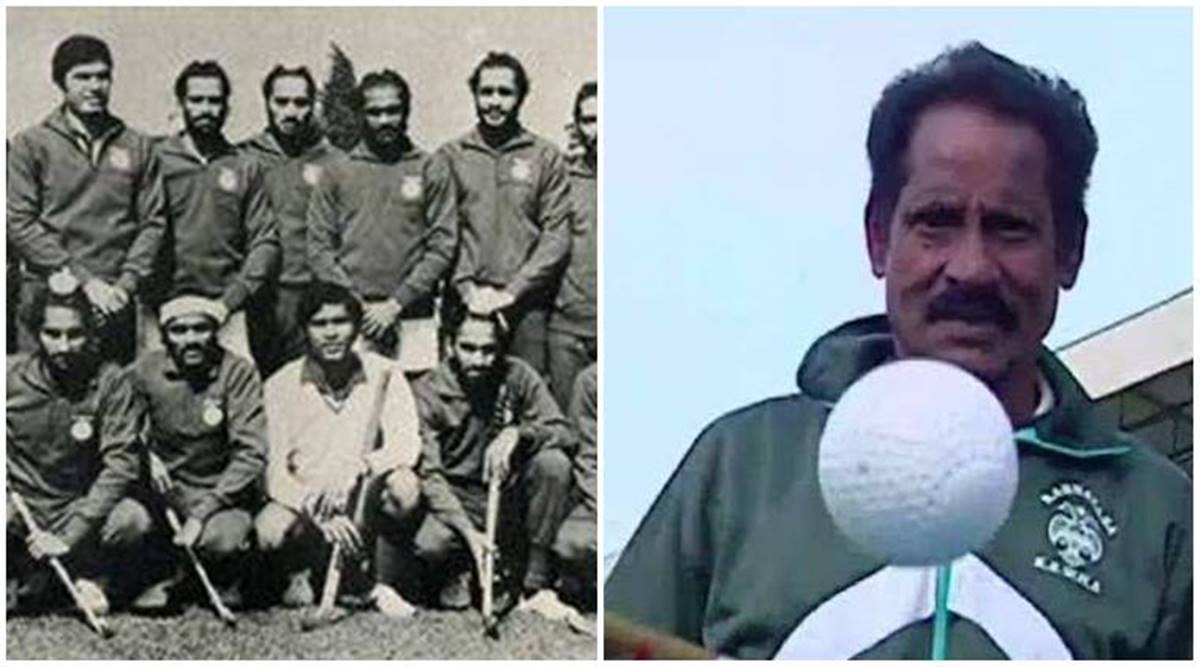
Manuel FredericksManuel ‘Tiger’ Fredericks is the lone Olympic medallist from Kerala. (Facebook/Manuel Fredericks)
In the late 1960s and till the mid-’70s, Manuel ‘Tiger’ Fredericks in front of goal was so famous that even film stars used to rush to the stadiums across the country to watch him play.
Some of the stars who witnessed him play regularly include Sunil Dutt, director Raj Khosla, Dara Singh, his brother Randhawa and wife Mallika, Murad, Johnny Walker, Thangavel, Murugesh among others.
Fredericks, now 73, still roots for the Indian hockey team which will be playing in the upcoming Tokyo Olympic Games.
Back home in Kerala, he is an almost unknown figure. “Many do not even know me that I’m the only Olympic medal winner from the State or that hockey was most popular and even our national game,” rues Fredericks who left his home at Payyambalam in Kannar when he was just 13 to join Army School Sports Company in Bengaluru in 1961.
He soon joined Army Service Corps (ASC) in 1965 and helped them win 21 national major titles such as Beighton Cup (Kolkata), Aga Khan Tournament (Mumbai), Madras Challenge Cup-Murugappa Gold Cup, Janaki Ammal Memorial Trophy at Sivakasi, Obaidullah Khan Gold Cup (Bhopal), Maharaja Gold Cup (Gwalior) and was soon invited to the national camp.
He was first called to do national duty for the 1972 Munich Olympics which was marred by a terrorist attack in which 11 Israeli athletes were killed.
The then 25-year-old Indian custodian vividly remembers the day. “Our semifinal against Pakistan too was scheduled. The attack happened just 100 feet from where we stayed. We’re shell-shocked and tensed. The match was later postponed and held on Friday which we lost by a solitary goal. The Pak winner came from a penalty stroke, I saved it but unfortunately hit the goalpost bar and came inside. It was sheer bad luck for me,” recalled Fredericks.
“We’re aspiring for the gold medal and I was in great form too but lacked match experience particularly against Pakistan. However, we settled for the bronze medal beating Holland 2-1,” said Fredericks who played with and against include who is who of Indian and World hockey. His teammates included Ashok Kumar, son of Dhyan Chand, Ajit Pal Sing, M P Ganesh, B P Govinda, Vece Paes, Harbinder Singh, Harcharan Singh, Mukhbain Singh and rivals were Great Britain’s Rhys Smith, Luke Taylor, Holland’s Ties Kruize, Andre Bolhuis and Ric Charlesworth of Australia.
“I have won Beighton Cup for Mohun Bagan and Paes was my colleague then while Keshav Dutta who recently passed away was our team in charge,” Fredericks said about his stint in Kolkata maidan.
On Olympic prospects
“I don’t know the reason why they dropped forwards (SV) Sunil and Akashdeep Singh and midfielder Lalit Kumar Upadhyay. I’m sure this team is capable of making it big,” said an upbeat Fredericks. “It is a good team, young and I love to see them bring a medal.”
On PR Sreejesh, who like him will be guarding the Indian goal, Fredericks told indianexpress.com, “Sreejesh has a lot of self-confidence and gained experience over the years. I wish him and the team the very best.”
Fredericks is hopeful that the Rani Rampal-led women’s team too will return triumphant.
Indian Express
Indian hockey team captains at the Olympics: From Jaipal Munda to Manpreet Singh
Manpreet Singh will captain the Indian men’s hockey team at Tokyo 2020 while Rani Rampal will be incharge of the women’s team.
By Abhishek Purohit
Picture by Hockey India
When Manpreet Singh walks out against New Zealand at Tokyo 2020 on July 24, he will become the 21st captain to lead an Indian men’s hockey team at the Olympics.
Manpreet Singh will join an illustrious list that includes legends like Dhyan Chand, Kunwar Digvijay Singh and Balbir Singh (senior), among others, who have had the honour of leading the Indian squad out at the Summer Games.
Jaipal Singh Munda was the first captain of an Indian hockey team at the Olympics when they won gold on debut at Amsterdam 1928.
Syed Lal Shah Bokhari, who led the Indian hockey team to another gold medal at Los Angeles 1932, became a diplomat later for Pakistan post India’s independence and partition.
The legendary Dhyan Chand (bottom, right) led the Indian hockey team at the 1936 Berlin Games. Picture by Getty Images
Dhyan Chand (Amsterdam 1928, Los Angeles 1932, Berlin 1936) and Balbir Singh Dosanjh (London 1948, Helsinki 1952, Melbourne 1956) were each part of three gold-medal winning Indian hockey teams.
Dhyan Chand was the skipper for the 1936 edition while Balbir Singh Sr. captained the team at the 1956 Melbourne Games.
Leslie Claudius went a step further, winning four hockey medals at the Olympics, including three gold and a silver (Rome 1960). He himself oversaw the 1960 triumph.
India had joint captains for the Mexico City Olympics in 1968, when Gurbux Singh and Prithipal Singh led the side to a bronze medal.
Pargat Singh is the only man to lead India in field hockey at two Olympics. He was captain for Barcelona 1992 and Atlanta 1996.
Tamil Nadu’s Vasudevan Baskaran, the Indian skipper at Moscow 1980, remains the last Olympics gold-medal winning captain of an Indian hockey team.
For women, Rupa Saini was the captain at Moscow 1980, where women’s hockey made its Games debut.
Sushila Chanu Pukhrambam took up the mantle when the Indian women’s hockey team qualified next for the Olympics at Rio 2016 after a 36-year-long hiatus.
Forward Rani Rampal will be in charge of the Indian women’s hockey team’s campaign at Tokyo 2020.
Full list of Indian hockey captains at Olympics
Men
| Captain | Year | Venue | Result |
|---|---|---|---|
| Jaipal Singh Munda | 1928 | Amsterdam | Gold |
| Syed Lal Shah Bokhari | 1932 | Los Angeles | Gold |
| Dhyan Chand | 1936 | Berlin | Gold |
| Kishan Lal | 1948 | London | Gold |
| KD Singh 'Babu' | 1952 | Helsinki | Gold |
| Balbir Singh Sr. | 1956 | Melbourne | Gold |
| Leslie Claudius | 1960 | Rome | Silver |
| Charanjit Singh | 1964 | Tokyo | Gold |
| Gurbux Singh / Prithipal Singh | 1968 | Mexico City | Bronze |
| Harmik Singh | 1972 | Munich | Bronze |
| Ajit Pal Singh | 1976 | Monteral | 7th |
| Vasudevan Baskaran | 1980 | Moscow | Gold |
| Zafar Iqbal | 1984 | Los Angeles | 5th |
| MM Somaya | 1988 | Seoul | 6th |
| Pargat Singh | 1992 | Barcelona | 7th |
| Pargat Singh | 1996 | Atalanta | 8th |
| Ramandeep Singh Grewal | 2000 | Sydney | 7th |
| Dilip Tirkey | 2004 | Athens | 7th |
| Bharat Chettri | 2012 | London | 12th |
| PR Sreejsh | 2016 | Rio | 8th |
| Manpreet Singh | 2020 | Tokyo | TBD |
Women
| Name | Year | Venue | Result |
|---|---|---|---|
| Rupa Saini | 1980 | Moscow | 4th |
| Sushila Chanu | 2016 | Rio | 12th |
| Rani Rampal | 2020 | Tokyo | TBD |
